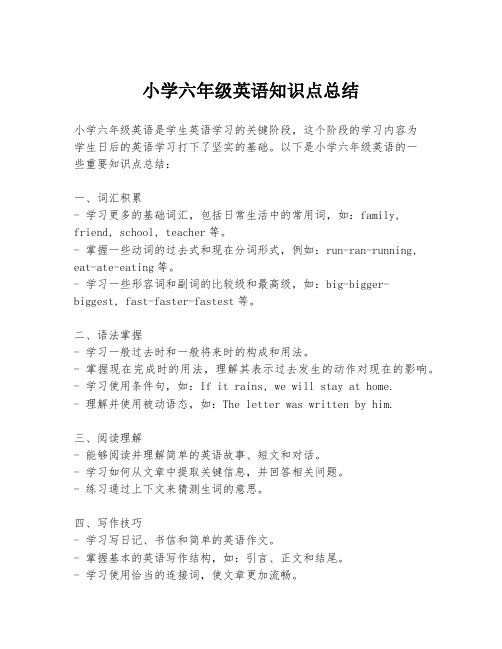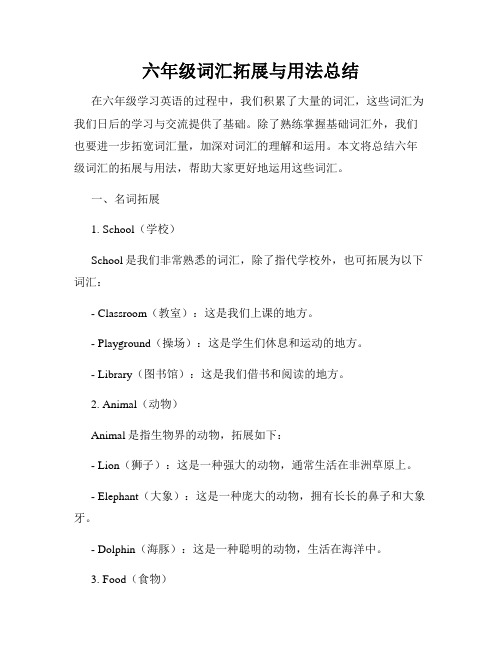三鑫小学六年级英语知识拓展
小学六年级英语知识点总结

小学六年级英语知识点总结小学六年级英语是学生英语学习的关键阶段,这个阶段的学习内容为学生日后的英语学习打下了坚实的基础。
以下是小学六年级英语的一些重要知识点总结:一、词汇积累- 学习更多的基础词汇,包括日常生活中的常用词,如:family, friend, school, teacher等。
- 掌握一些动词的过去式和现在分词形式,例如:run-ran-running, eat-ate-eating等。
- 学习一些形容词和副词的比较级和最高级,如:big-bigger-biggest, fast-faster-fastest等。
二、语法掌握- 学习一般过去时和一般将来时的构成和用法。
- 掌握现在完成时的用法,理解其表示过去发生的动作对现在的影响。
- 学习使用条件句,如:If it rains, we will stay at home.- 理解并使用被动语态,如:The letter was written by him.三、阅读理解- 能够阅读并理解简单的英语故事、短文和对话。
- 学习如何从文章中提取关键信息,并回答相关问题。
- 练习通过上下文来猜测生词的意思。
四、写作技巧- 学习写日记、书信和简单的英语作文。
- 掌握基本的英语写作结构,如:引言、正文和结尾。
- 学习使用恰当的连接词,使文章更加流畅。
五、听力理解- 能够听懂简单的英语对话和短文。
- 学习如何从听力材料中获取信息,并回答相关问题。
- 练习在听力理解中识别不同的语音语调。
六、口语表达- 能够用英语进行日常对话,表达自己的意见和感受。
- 学习使用恰当的礼貌用语和表达方式。
- 练习在不同情境下使用英语进行交流。
七、文化理解- 了解一些英语国家的文化习俗和节日。
- 学习一些简单的英语谚语和习语。
结尾小学六年级的英语学习是一个全面的过程,不仅需要掌握语言知识,还要培养语言技能。
希望以上的知识点总结能够帮助学生们更好地复习和巩固所学内容,为进入初中阶段的学习做好准备。
六年级下册英语拓展知识点

六年级下册英语拓展知识点在六年级的英语学习中,我们不仅需要掌握基础的语法和词汇,还需要了解一些拓展的知识点,以提高我们的英语水平。
以下是一些六年级下册英语的拓展知识点,帮助我们更好地学习和运用英语。
一、复数形式1. 一般情况下,名词的复数形式在词尾加-s,如books(书)、desks(桌子)等。
2. 以s、x、z、ch、sh 结尾的名词,复数形式是在词尾加-es,如buses(公共汽车)、watches(手表)等。
3. 以辅音字母+y结尾的名词,复数形式变y为i,再加-es,如butterflies(蝴蝶)、babies(婴儿)等。
二、比较级与最高级1. 形容词的比较级和最高级的构成方式:(1)单音节词和部分双音节词,在词尾加-er和-est,如longer(更长的)、tallest(最高的)。
(2)以字母e结尾的词,在词尾加-r和-st,如nicer(更好的)、nicest(最好的)。
(3)以辅音字母+y结尾的词,变y为i,再加-er和-est,如happier(更快乐的)、happiest(最快乐的)。
(4)部分双音节词和大多数多音节词,在前面加more和most,如more beautiful(更漂亮的)、most interesting(最有趣的)。
三、冠词的用法1. 不定冠词a/an:(1)a用于以辅音音素开头的词前,an用于以元音音素开头的词前,如a cat(一只猫)、an apple(一个苹果)。
(2)不定冠词表示泛指或指示数量为一。
2. 定冠词the:(1)the用于特指某个或已知的人或物,如the sun(太阳)、the book on the desk(桌子上的那本书)。
(2)the用于泛指整个类别、乐器、船、餐馆等,如the sky (天空)、the piano(钢琴)。
四、情态动词的使用情态动词用来表示说话人的意愿、能力、推测、允许、禁止等情态,常见的情态动词有can、could、may、might、will、would、shall、should、must等。
六年级英语扩展知识点归纳

六年级英语扩展知识点归纳英语作为一门国际语言,对于现代学生来说是必不可少的一门科目。
而在学习的过程中,难免会遇到一些扩展知识点,这些知识点虽然不在考试范围内,但对于扩展英语知识面和提高整体英语水平都有一定帮助。
下面将对六年级英语扩展知识点进行归纳。
1. 乐器名称音乐是英语学习中的重要一环,而乐器名称是其中一部分内容。
学习乐器名称可以扩展学生的词汇量,以及对音乐的理解。
以下是一些常见乐器名称:- 钢琴:piano- 小提琴:violin- 吉他:guitar- 鼓:drum- 萨克斯ophone:saxphone- 尺八:shakuhachi- 笛子:flute2. 动物分类了解动物的分类对于理解动物的特点和习性有很大帮助。
以下是一些常见的动物分类:- 哺乳动物:mammal- 鳄鱼和鸟类:reptile- 鱼类:fish- 蜘蛛和昆虫:insect- 鸟类:bird- 爬行动物:amphibian3. 文化习俗了解不同国家和文化的习俗可以帮助学生开阔眼界,增加对其他国家和文化的了解。
以下是一些常见的文化习俗:- 中国春节:Chinese New Year- 印度节日:Indian festivals- 日本传统:Japanese traditions- 西方婚礼习俗:Western wedding customs- 非洲部族文化:African tribal cultures4. 世界著名地标了解世界著名地标可以培养学生的地理意识和对世界的认知。
以下是一些常见的世界著名地标:- 中国长城:the Great Wall of China- 法国埃菲尔铁塔:Eiffel Tower in France- 英国伦敦塔桥:Tower Bridge in London, UK- 美国自由女神像:Statue of Liberty in the USA- 埃及金字塔:Pyramids of Egypt- 巴西里约热内卢基督像:Christ the Redeemer in Rio de Janeiro, Brazil5. 名著及作家了解一些经典的英语名著和作家可以帮助学生提高阅读能力和对英语文学的了解。
六年级词汇拓展与用法总结

六年级词汇拓展与用法总结在六年级学习英语的过程中,我们积累了大量的词汇,这些词汇为我们日后的学习与交流提供了基础。
除了熟练掌握基础词汇外,我们也要进一步拓宽词汇量,加深对词汇的理解和运用。
本文将总结六年级词汇的拓展与用法,帮助大家更好地运用这些词汇。
一、名词拓展1. School(学校)School是我们非常熟悉的词汇,除了指代学校外,也可拓展为以下词汇:- Classroom(教室):这是我们上课的地方。
- Playground(操场):这是学生们休息和运动的地方。
- Library(图书馆):这是我们借书和阅读的地方。
2. Animal(动物)Animal是指生物界的动物,拓展如下:- Lion(狮子):这是一种强大的动物,通常生活在非洲草原上。
- Elephant(大象):这是一种庞大的动物,拥有长长的鼻子和大象牙。
- Dolphin(海豚):这是一种聪明的动物,生活在海洋中。
3. Food(食物)Food是指我们日常所吃的食物,在此基础上可以拓展为以下词汇:- Sandwich(三明治):这是一种常见的方便食品,由面包片和夹心食材组成。
- Pizza(披萨):这是一种来自意大利的美食,通常由面团和各种配料制作而成。
- Salad(沙拉):这是一种健康的食物,由蔬菜、水果、肉类等组成。
二、形容词拓展1. Happy(快乐的)Happy是我们常用的形容词,也可进一步拓展为以下词汇:- Excited(兴奋的):当我们遇到开心的事情时,我们会感到非常兴奋。
- Content(满足的):当我们得到想要的东西时,我们会感到满足和愉悦。
- Fulfilled(满意的):当我们完成一项任务时,我们会感到充实和满意。
2. Big(大的)Big是一个常见的形容词,用于描述物体的尺寸。
类似的词汇还有:- Huge(巨大的):用于形容非常庞大的物体。
- Spacious(宽敞的):用于形容空间很大的场所。
- Enormous(巨大的):用于形容非常庞大的事物。
六年级英语知识重点知识点

六年级英语知识重点知识点一、词汇1. 基础词汇:认识并正确拼写基础单词,包括常见名词、动词、形容词等。
2. 词组搭配:掌握常见的词组搭配,如动词短语、形容词短语等,能够正确运用。
二、语法1. 冠词:掌握a/an/the的用法,能够准确选择适当的冠词填空。
2. 时态:了解一般现在时、一般过去时和将来时的构成和用法,能够在句子中正确运用。
3. 代词:认识并正确使用人称代词、物主代词和反身代词。
4. 比较级与最高级:掌握形容词和副词的比较级和最高级形式,能够进行比较描述。
5. 句型转换:掌握肯定句、否定句、疑问句等基本句型的转换,能够进行简单句型变换。
三、阅读理解1. 短文阅读:能够读懂简短的英语短文,理解文章的大意和基本信息。
2. 阅读技巧:掌握一些阅读技巧,如根据关键词判断答案、根据上下文推断词义等。
四、口语表达1. 日常对话:能够进行简单的日常对话,包括问候、介绍自己、问询他人等。
2. 角色扮演:参与角色扮演活动,能够在特定情境中运用所学知识进行沟通。
五、写作能力1. 句子构建:能够用正确的语法结构构建简单的英语句子,表达自己的思想和意见。
2. 作文写作:通过模仿和创作,能够撰写一些简单的英语短文,如书信、日记等。
六、听力技巧1. 听懂指令:能够听懂老师的简单指令,如听懂做某项活动的步骤等。
2. 听懂对话:能够听懂简单的对话内容,理解对话中的基本信息。
以上就是六年级英语的重点知识点,通过学习和练习这些知识,相信大家的英语水平会有所提高。
希望大家在英语学习中能够坚持不懈,多进行口语和写作的练习,提升自己的英语表达能力。
祝大家学习进步!。
英语六年级知识点扩展

英语六年级知识点扩展English Knowledge Extension for Sixth GradeIn the sixth grade, students continue to expand their knowledge of the English language. They build upon the skills and concepts they have learned in previous years and delve deeper into the intricacies of grammar, vocabulary, reading, and writing. This article aims to explore various knowledge points for sixth-grade English learners, providing a comprehensive understanding of the subject matter.1. Enhancing Grammar SkillsGrammar forms the foundation of any language, and sixth-grade English students focus on reinforcing and expanding their knowledge of grammar rules. Here are several key areas of grammar for students to explore:a. Parts of Speech: Reviewing the eight basic parts of speech, including nouns, verbs, adjectives, adverbs, pronouns, prepositions, conjunctions, and interjections.b. Verb Tenses: Learning about different verb tenses, such as present, past, and future tense, and understanding how they are used to indicate time.c. Subject-Verb Agreement: Practicing the agreement between subjects and verbs, ensuring they match in number (singular or plural).d. Sentence Structure: Studying sentence types (declarative, interrogative, imperative, and exclamatory) and learning to construct sentences with proper subject-verb-object order.2. Expanding VocabularyTo become proficient in a language, students must continuously expand their vocabulary. Here are some effective methods to accomplish this:a. Word Roots and Affixes: Understanding the meaning of common prefixes, suffixes, and root words to decode unfamiliar words.b. Context Clues: Developing the skill to use surrounding words and sentences to grasp the meaning of unknown words.c. Synonyms and Antonyms: Exploring words with similar and opposite meanings to expand their vocabulary range.d. Word Relationships: Understanding how words are related to each other, such as synonyms, homonyms, and homophones.3. Developing Reading SkillsReading is an essential aspect of language learning, enabling students to comprehend and interpret various texts. Here are some ways to enhance reading skills:a. Comprehension Strategies: Teaching students to use strategies like predicting, questioning, making connections, visualizing, and summarizing to understand a text deeply.b. Text Types: Exposing students to different text genres such as fiction, non-fiction, poetry, and informational texts to broaden their understanding of various writing styles.c. Reading Fluency: Encouraging students to practice reading aloud to improve accuracy, speed, and expression.d. Critical Thinking: Engaging students in discussions about texts, encouraging them to analyze and interpret the content, characters, and themes.4. Strengthening Writing SkillsWriting skills play a crucial role in effectively conveying thoughts and ideas. In sixth grade, students focus on developing the following writing skills:a. Narrative Writing: Learning to write engaging stories with a clear beginning, middle, and end, incorporating descriptive language and utilizing dialogue.b. Expository Writing: Developing informative and explanatory essays, using facts, examples, and logical organization to present ideas.c. Persuasive Writing: Understanding the structure of persuasive writing and learning how to construct arguments and support them with evidence.d. Editing and Revising: Emphasizing the importance of reviewing and improving written work by checking for grammar, punctuation, coherence, and clarity.In conclusion, the knowledge points mentioned above provide a comprehensive overview of the English language skills that sixth-grade students should focus on expanding. By strengthening their grammar, vocabulary, reading, and writing skills, students can effectively communicate and comprehend the English language, setting a strong foundation for future language acquisition.。
六年级英语上册Module6拓展资料外研版三起

六年级英语上册拓展资料外研版三起:
筷子的来历
我国使用筷子的时间,有史记载的历史已有3000 多年。
《史记・宋微子世家》中有“纣始为象箸”的记载,可见从商纣王时代,我国人民就开始使用筷子吃饭了。
古时候,人们把筷子称作“筯”或者“箸”。
后来,古人忌讳字音,认为“箸”同“住”谐音,有停止之意,不太吉利,人们便反其意而称呼它,叫成“快”。
又因为箸大都是使用竹子制成的,所以,又在快字上面加了竹字头,这便成了我们今天称叫的“筷子”了。
筷子有铁制、金制、竹制、银制、木制、塑料制、象牙制、铝制等许多种类。
古代王公贵族为显示豪华、奢侈,往往用银筷子吃饭。
另外,使用银筷子时,还可以识别一些有毒食物,因为银遇到含硫的毒物,表面会变成黑色。
筷子的使用简图
1。
六年级下册英语知识点拓展

六年级下册英语知识点拓展一、名词的复数形式在英语中,名词的复数形式是实现单复数转换的一种重要语法规则。
通常情况下,我们在名词末尾加上-s来表示复数形式,例如:book(单数)→books(复数)。
但是也有一些特殊情况需要注意。
1. 以-s、-sh、-ch、-x、-z结尾的名词,在末尾加上-es来表示复数形式,例如:bus(单数)→buses(复数),watch(单数)→watches(复数)。
2. 以辅音字母+y结尾的名词,在末尾去掉y,加上-ies来表示复数形式,例如:baby(单数)→babies(复数),story(单数)→stories(复数)。
3. 以-f或-fe结尾的名词,在末尾去掉f或fe,加上-ves来表示复数形式,例如:leaf(单数)→leaves(复数),knife(单数)→knives(复数)。
4. 有些名词的复数形式不规则,需要单独记忆,例如:man(单数)→men(复数),woman(单数)→women(复数)。
二、比较级和最高级比较级和最高级是表示比较关系的形容词变化形式,用于对两个或多个人或物进行比较。
1. 单音节形容词和一些双音节形容词的比较级和最高级,在词尾加上-er和-est,例如:big(大)→bigger(更大)→biggest(最大)。
2. 以辅音字母加y结尾的形容词,将y变为i,然后加上-er和-est,例如:happy(高兴的)→happier(更高兴的)→happiest(最高兴的)。
3. 部分双音节和多音节形容词,前面加上more和most,例如:beautiful(美丽的)→more beautiful(更美丽的)→most beautiful (最美丽的)。
三、主谓一致在英语中,主语和谓语要保持一致,即主语为单数时,谓语动词也要用单数形式;主语为复数时,谓语动词也要用复数形式。
1. 当主语为第三人称单数(he、she、it)时,谓语动词要加上-s或-es,例如:She plays basketball.(她打篮球。
- 1、下载文档前请自行甄别文档内容的完整性,平台不提供额外的编辑、内容补充、找答案等附加服务。
- 2、"仅部分预览"的文档,不可在线预览部分如存在完整性等问题,可反馈申请退款(可完整预览的文档不适用该条件!)。
- 3、如文档侵犯您的权益,请联系客服反馈,我们会尽快为您处理(人工客服工作时间:9:00-18:30)。
三鑫小学六年级英语知识拓展综合复习资料英语试题(卷3)第一卷(50分)一、选择填空(共20分,每小题1分)从下列各题所给的四个选项中选择正确的一项。
( )1.We usually have a football match ________ Sunday.A. inB. onC. atD. to( )2.—There ________ a lot of meat on the plate. Would you like some?—Just a little, please.A. isB. areC. amD. be( )3.Of all the students, Linda draws ________ carefully .A. veryB. muchC. moreD. most( )4.—What is Mum doing now? —She ________ some clothes.A. washesB. is washingC. washedD. has washed( )5.There isn’t ________ water in the glass. Let’s go and get some.A. manyB. lotsC. anyD. some( )6.Tomorrow’s meeting is very important. Please ask them ______ there on time.A. goB. goingC. to goD. went( )7.—Why are you walking to school? —Because my ________ is broken.A. radioB. watchC. bikeD. bag( )8.Betty didn’t come to school yesterday ________ she was ill.A. butB. thanC. ifD. because( )9.Do you enjoy ________ English in our class, Mr. Green?A. teachB. taughtC. to teachD. teaching( )10.Mid-Autumn Day usually ________ in September or October every year .A. comeB. comesC. is comingD. will come( )11.Mike looks ________ than Paul, but they are of the same age.A. youngestB. the youngestC. youngerD. very young( )12.—Where is Mrs. Smith? —She isn’t here. She ________ to England .A. has goneB. has beenC. wentD. goes( )13.Mrs. Green is out. I have to ________ her baby.A. look aroundB. look upC. look forD. look after( )14.—Dad, must I finish my homework today?—No, you ________ . You may do it tomorrow.A. needn’tB. mustn’tC. don’tD. won’t( )15.Mr.Thin was very poor, ________ he was very happy.A. andB. butC. orD. so( )16.—Shall we leave now? —Don’t hurry. We still have ________ time left.A. littleB. a littleC. fewD. a few( )17.We’re in class. You’d better not .A. talkB. talkingC. talkedD. to talk( )18.—Guess ________ I did yesterday! —I think you went to a party.A. whereB. whenC. whatD. which( ) 19________ away this dirty shirt and bring me a clean one.A. PickB. BringC. CarryD. Take( )20.I am a student. ________ name is Tom.A. MyB. YourC. HisD. Her二、完形填空(共10分,每小题1分)通读下面短文,掌握其大意,然后从短文后各题所给的四个选项中选择最佳的一项。
Mike always loves ships. When he was older, he said, “I’m going to be a soldier.”But his eyes were not very 21 , and he did not get in.Then he said, “I’m going to 22 a small boat and I’m going around the world.”But boats were very expensive, and Mike did not have enough 23 .Last summer Mike found a swimming 24 near his house. The lessons did not cost very 25 , and Mike began going to the school at every end of the week and having 26 . Now he is a good swimmer.Last week a little boy said to him, “You’re a very good swimmer. How do 27 learn to swim so well?”“I’m not good at all,” Mike said and he smiled.“28I’m in the water, I say to myself. There are 29 fishes behind me! Then I’m very afraid, and I 30 quickly.”( )21. A. big B. beautiful C. good D. strong( )22. A. buy B. make C. borrow D. draw( )23. A. food B. work C. time D. money( )24. A. park B. school C. farm D. factory( ) 25. A. much B. little C. many D. any( )26. A. meals B. lessons C. talks D. games( )27. A. I B. they C. we D. you( )28. A. If B. When C. Though D. Where( )29.A. interesting B. nice C. dangerous D. different( )30. A. run B. jump C. swim D. fly三、阅读理解(共20分,每小题2分)阅读下面短文,然后从短文后各题所给的四个选项中选择正确的一项。
AOne day, Bruce played in front of a house. A woman came up and asked Bruce, “Little boy, is your mother at home?”“Yes, she is,” answered the boy.Then the woman went over to ring the bell. The bell rang and rang, but no one came to open the door. The woman got angry and called out to him, “You told me your mother was at home, didn’t yo u?”“Yes,” the boy answered. “My mother is at home, but this isn’t my home.”( )31.One day, Bruce played ________.A. in a parkB. in the streetC. in front of a shopD. in front of a house( )32.The woman wanted to see ________.A. Br uce’s motherB. Bruce’s fatherC. Bruce himselfD. nobody( )33.The woman went over to ________ after she talked with Bruce.A. knock at the door of the houseB. ring the bell of the houseC. give a call to his motherD. ask his mother some questions( )34.The woman got ________ because no. one came to open the door.A. pleasedB. surprisedC. angryD. afraid( )35.In the story the woman didn’t find Bruce’s mother because _______.A. she went to the wrong houseB. she didn’t know Bruce’s motherC. Bruce was not at homeD. Bruce didn’t have a motherBThe word “day” has two meanings. When we talk about the number of days in a year, we are using “day” to mean 24 hours. But when we talk about day and night, we are using “day” to mean the time between sunrise and sunset. Since the earth looks like a ball, the sun can shine on only half of it at a time. Always one half ofthe earth is having day and the other half night. A place is moved from day into night and from night into day over and over by the spinning(旋转)of the earth. At the equator(赤道)day and night are sometimes the same length(长度). They are each twelve hours long. The sun rises at 6 o’clock in the morning and sets at 6 o’clock in the evening. For six months the North Pole is tilted(倾斜)toward the sun. In those months the Northern Hemisphere(半球)gets more hours of sunlight than the Southern Hemisphere. Days are longer than nights. South of the equator nights are longer than days. For the other six months the North Pole is tilted away from the sun. Then the Southern Hemisphere gets more sunlight. Days are longer than nights. North of the equator nights are longer than days. Winter is the season of long nights. Summer is the season of long days.( )36.When the Western Hemisphere is having day, the Eastern Hemisphere is having ________.A. both day and nightB. dayC. neither day nor nightD. night ( )37.A place is moved from day into night and from night into day over and over by ________ of the earth.A. the pushingB. the pullingC. the spinningD. the passing ( )38.At the equator day is as long as night ________.A. sometimesB. neverC. usuallyD. always( )39.When the North Pole is tilted toward the sun, the Northern Hemisphere gets ________ sunlight.A. lessB. moreC. allD. no( )40.When it is winter in China, ________.A. the USA is tilted toward the sunB. the South Pole is tilted away from the sunC. the North Pole is tilted toward the sunD. the North Pole is tilted away from the sun第二卷(30分)四、完成句子(共20分,每个空白1分)根据所给中文意思,在空白处填入适当词语完成句子。
